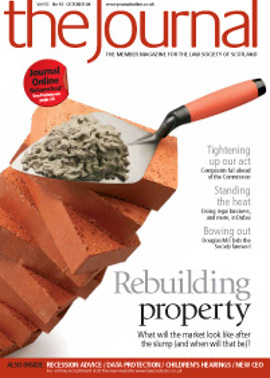From agreement to obligation

As the planning system in Scotland undergoes radical transformation with the impending implementation of the Planning etc (Scotland) Act 2006, the law governing s 75 agreements is in line for significant reform.
Section 75 agreements are contracts voluntarily entered into between a landowner, developer and a planning authority. Through these agreements, planning authorities can restrict or regulate the development or use of land and can recover contributions towards the delivery of essential infrastructure, such as roads, drainage systems and schools etc. According to a recent Scottish Government publication, An Assessment of the Value of Planning Agreements in Scotland, the amount of known contributions made in the past three years totals £116m. The current law is contained in s 75 of the Town and Country Planning (Scotland) Act 1997. The amendments are introduced by s 23 of the 2006 Act and depart significantly from the existing regime.
Under the 2006 Act, “planning agreements” have been replaced by “planning obligations” and the existing legislation has been altered to include more detailed provisions on planning obligations. Indeed, whilst the current law provides little detail regarding the nature of these agreements and their content, the 2006 Act attempts to rectify this. The 2006 Act states that planning obligations may be unconditional or subject to conditions or may require a one off or periodical payment of money.
Unilateral agreements
The 2006 Act introduces unilateral undertakings. A unilateral undertaking allows landowners and developers to enter into an obligation, which restricts the development or use of the land without the agreement of the planning authority. This is intended to overcome the difficulties that are currently encountered where a planning authority refuses to be a party to an agreement in circumstances where they have refused planning permission and that decision is subject to appeal. If the appeal is successful, a planning authority cannot be compelled to enter an agreement, and this amendment seeks to overcome this by allowing a unilateral agreement to be offered.
Modification and discharge
Under the new Act, planning obligations will be capable of modification or discharge if all the parties to the agreement consent. If the planning authority refuses to modify or discharge the obligations, the Act provides the applicant with a right of appeal to Scottish Ministers. This differs from the current situation, in which there are no statutory provisions for applying for modification or discharge of agreements, or appeals against a refusal to modify or discharge them. Secondary legislation is required in order to regulate such applications and appeals and it is anticipated that this will define the circumstances in which applications and/or appeals may be made.
Liability of former owners
Another major change introduced by the 2006 Act is that unless the s 75 agreement states otherwise, the previous owner will remain liable for any planning obligations they undertook while they owned the land. This continuing liability will apply in relation to any “appropriate requirement” contained in the agreement. An “appropriate requirement” will be an obligation to carry out operations or activities on, under or over the land. It could also be a requirement to use the land in a specified way; pay a specified amount or an amount determined in accordance with the agreement; or pay periodical sums either indefinitely or for a specific period as laid out in the agreement. The current and former owners of land will be held jointly and severally liable for obligations for which the former owner is liable. Similarly, any expenditure incurred by a new owner in the performance of an obligation for which a former owner is liable, may seek the recovery from the former owner of an amount equal to that expenditure.
This is a radical departure from the existing law whereby the conditions imposed in an agreement normally run with the land and the previous owner escapes liability once the land has been passed on. There would appear to be only limited circumstances in which previous owners would wish to accept liability for obligations once they have ceased to be owners, but unless the agreement explicitly excludes this by appropriate wording to this effect they will be so bound.
Whilst the 2006 Act was given royal assent in December 2006, the date for the amendment of s 75 of the 1997 Act has yet to be announced. We must also await the publication of the draft regulations to shed light on how these changes will be implemented.
Alastair McKie, Partner and Head of Planning and Environment, Anderson Strathern LLPL
In this issue
- IHT: spouses and the nil rate band
- Taking up the message
- SGM: support for review process
- Rebuilding to order?
- Nipped in the bud?
- Hearing better
- Dubai: an ever-expanding market
- When is a discharge not a discharge?
- Out of the hot seat
- Site to behold
- Now for the real thing
- Navigating the perfect storm
- Data, personal data and statistics
- Caring about sharing
- Rainmaker - or cloud on the horizon?
- The limits of belief
- Process queries
- Scottish Solicitors' Discipline Tribunal (1)
- Scottish Solicitors' Discipline Tribunal (2)
- From agreement to obligation
- Ganging up on exploitation
- Scottish Solicitors' Discipline Tribunal
- Website review
- Book reviews
- Up for the big event
- Old lessons hold good
- The revolution starts here?
- CML Handbook: why the fuss?






